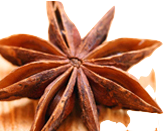Star anise and anise
Avoid star anise and anise
Star Anise is a phytoestrogen and an endocrine disruptor. It contains veranisatins in low concentrations. This may be enough in infants to produce adverse neurologic reactions. Endocrine disruptors go firstly to the neurological systems. This can lead to autism, dementia, deficit disorders. Some reports have found imported herbs and teas containing Chinese star anise (Illicium verum) to be contaminated with Japanese star anise (Illicium anisatum), a known neurotoxin. In patients with convulsive disorders, such as epilepsy, Chinese star anise should be avoided based on its theoretical convulsive effects. Star anise is to be avoided with PKD/PLD.
Japanese star anise (Illicium anisatum), a similar tree, is not edible because it is highly toxic (due to containing sikimitoxin); instead, it has been burned as incense in Japan. Cases of illness, including "serious neurological effects, such as seizures", reported after using star anise tea may be a result of using this species. Japanese star anise contains anisatin, which causes severe inflammation of the kidneys, urinary tract and digestive organs.The toxicity of Illicium anisatum, also known as Shikimi, is caused by its content in potent neurotoxins (anisatin, neoanisatin, and pseudoanisatin), due to their activity as non-competitive antagonists of GABA receptors.
Anise is also to be avoided as it too is a phytoestrogen. In large doses it is toxic to the liver. Anise should not be used with hormonal sensitive conditions such as PLD, uterine fibroids; endometriosis; or uterine, breast and ovarian cancers.
